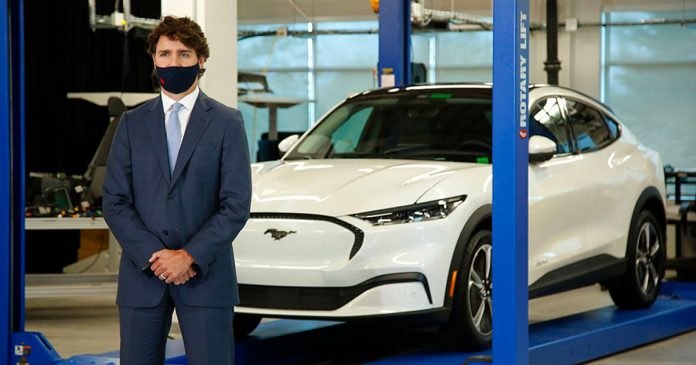Prime Minister Justin Trudeau has an aversion for the car, even though he gets comfortably chauffeured in a Chevy Suburban by a security detail.
He would like to see all Canadians driving electric vehicles by 2035. He would love it even more if the oil sands closed down.
He is willing to phase in his government’s electric car mandate, of course. But one-fifth of all passenger cars, SUVs and trucks sold in Canada in 2026 will need to run on electricity under new regulations Environment Minister Steven Guilbeault has proposed.
By 2030, the mandate will hit 60% of all sales and by 2035, every passenger vehicle sold in Canada will need to be electric.
It is going to be hell.
Trudeau hates cars so badly, in fact, that between February and March, our car-loathing PM flew in Royal Canadian Air Force executive jets 17 times, roughly once every other day.
Ten of those flights — nearly 60% — were under an hour’s duration. Trudeau, in fact, seems especially in love with the 22-minute flight between Ottawa and Montreal where his Papineau riding is located.
On St. Patrick’s Day, he had the arrogance to add to his already substantial carbon footprint by ordering his jet to come pick him up from an appearance in Waterloo, Ont. — for a flight time of approximately 20 minutes — rather than sticking himself with the hour-long chauffeured drive to Toronto where his jet was parked.
As Sun columnist Lorne Gunter put it, “better Canadian taxpayers be out of pocket than His Holiness, Canada’s 23rd prime minister, having to ride in the back of an – ugh – limo or a – shriek – Chevy Suburban, accompanied by a phalanx of motorcycles and police SUVs.”
But there is already a problem.
In the first six months of 2022, sales of fully electric and plug-in hybrid vehicles made up just 7.2% of new car registrations. For all of 2021, the proportion was 5.2%.
Cara Clairman, president and CEO of Plug’n Drive, a non-profit organization that encourages electric vehicle use, said the toughest part of promoting the change from gas-powered vehicles is availability.
“Long waiting lists are definitely discouraging consumers that are ready to make the switch,” she said. “And if we all agree that we’re in a climate emergency, we need to help consumers make the switch as soon as possible.”
Electric vehicle sales in Canada grew by more than one third in the first half of this year but they are not keeping pace with the rest of the world.
A report on global EV sales released by Bloomberg at the United Nations climate talks in Egypt said battery-electric and plug-in hybrid passenger vehicles accounted for nearly one in every eight vehicles sold worldwide between January and June.
That compares with one in 11 in the same period a year earlier.
Total sales for the period hit 4.3 million, a 70% increase over 2021. Bloomberg says they’re on track to hit 10.6 million vehicles by the end of December, which would be 61% more than in 2021.
Between January and June, 56% of global sales were made in China, 28% in Europe and 11% in the United States.
Canada, which accounted for about 1.5% of all global vehicle sales, was home to less than one per cent of all electric vehicle sales.
The Bloomberg report said Canada is among the countries “catching up” on electric vehicles.
Under Stephen Harper’s governance, relations between the U.S. and Canada were strained.
One of the reasons behind this was the issue of the Keystone XL pipeline, which would send Canadian oil to America.
President Obama vetoed the plan citing environmental concerns, a move which angered Harper who hoped it would create jobs for Canadians.
While Trudeau also claimed to support Keystone XL, he never batted an eye when Joe Biden, on his first day as president, revoked a permit for an add-on to the pipeline.
For Trudeau, all was going according to Hoyle.
Until it wasn’t. Based on average new vehicle registrations, the electric vehicle total would have to grow from 55,600 to about 480,000 over six months to hit that 60% target planned for 2030.
It is a safe bet that it won’t even come close to happening.











